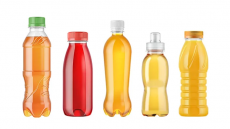Which ‘green’ regulations are impacting food and beverage, and what’s around the corner?

The agri-food industry is thought to be responsible for around a quarter of global greenhouse gas emissions. Pressure is mounting on food and beverage players to reduce their environmental footprints, which many are doing, voluntarily.
But not enough progress is being made, according to European policymakers, who in response have been proposing new regulations with sustainability in mind. And more are on the way, according to global law firm Squire Patton Boggs.
So which carbon-intensive areas of the supply chain in particular are catching the regulators’ eye?
Deposit return schemes to expand across the UK
Plastic pollution is one such area. Unless urgent action is taken, it is predicted there will be more plastic than fish in the sea by 2050.
An estimated 350m tonnes of plastic is produced every year, according to A Plastic Ocean, who has put a figure on the amount of plastic that ends up in the ocean: 8m tonnes.
To combat plastic pollution, policymakers are increasingly turning to deposit return schemes (DSR). According to such a scheme, consumers pay a small deposit when purchasing a beverage in a single-use container, and get the deposit back when they return the empty bottle or can.
The added benefit is that these schemes can help industry access greater quantities of recycled plastic content.
Successful schemes have been established in Europe, including in Denmark, Finland, and the Netherlands. Scotland is also preparing to bring in such a scheme later year with a 20p deposit.
This trend is likely to continue, according to Nicola Smith, a UK-based regulatory compliance expert at global law firm Squire Patton Boggs. “A deposit return scheme is due to come into force in Scotland in August 2023, and then potentially we’re going to see it an England, Wales, and Northern Ireland scheme – or schemes in each of those devolved nations following that,” she told FoodNavigator in an interview last week.
“I think that just highlights that that sort of sustainability is here to stay, and it’s gong to impact on the sector.”
Smith was on the money. Today (20 January 2023), the UK’s Department for Environment, Food & Rural Affairs (Defra) announced a DRS for beverage containers will start in England, Northern Ireland and Wales by October 2025.
The news has been welcomed by many in the industry. “DRS is not only critical to creating a circular economy for drinks containers, but essential to Suntory Beverage & Food GB&I’s net zero roadmap and that of the drinks industry,” commented the company’s head of sustainability and external affairs Liz Nieboer. “The sooner England, Wales and Northern Ireland systems come on stream the better for the environment.”
Others, including members of the hospitality sector, are supportive as long as policymakers learn from the DRS in Scotland. There is need for ‘ample time’ to bring businesses along on the journey to ensure it is ‘workable’, said UKHospitality Chief Executive Kate Nicholls.
“There will be nuances between sectors which need factoring into the scheme’s design,” she added. “For example, the operation of an online takeback scheme is simply not practical for hospitality. We would encourage the Government to provide an exemption for this, like in Scotland.”

The European Commission is similarly backing the circular economy and wants to eliminate all packaging in the EU market that is not reusable or recyclable (in an economically viable manner) by 2030.
No to single-use plastic, yes to multi-use packaging
A focus on disposable plastics has already seen single-use plastic plates, cutlery, straws, balloon sticks, and cotton buds, banned in the markets of EU Member States, as of 2 July 2021.
England similarly faces concerns over the amount of single-use plastic on its market. According to estimates, England uses 2.7bn items of single-use cutlery and 721m single-use plates per year – just 10% of which is recycled.
In response, Defra has announced a ban on a range of polluting single-use plastics as of October 2023. The ban will include single-use plastic plates, trays, bowls, cutler, balloon sticks, and certain types of polystyrene cups and food containers.
This will undoubtedly challenge many in the food and beverage sector. But Stephen Nolan, CEO of carbon footprint scoring service Foodprint by Nutritics, welcomed the legislation. “The single-use plastic ban in England has been a long time coming. There is an urgent need to reduce our use of single-use products, and this announcement is certainly a step in the right direction.”
Nolan did raise concerns, however, that placing a spotlight on plastic could risk businesses across the hospitality industry neglecting other important environmental concerns, such as supply chain emissions and food waste, “which we can’t afford to happen”.

In Germany, single-use plastic is a hot topic – particularly since as of 1 January 2023, restaurants and other takeout food establishments are required to supply multi-use packaging to customers.
This means that reusable cups, for example, need to be accessible, and products in reusable packaging cannot be more expensive than its counterpart in disposable packaging. Operators are allowed to issue reusable packaging in exchange for a deposit.
This means that companies like Starbucks and McDonald’s must offer their beverages in multi usable packaging, explained Squire Patton Boggs partner Dr Christofer Eggers, who works out of Frankfurt.
“If your shop is bigger than 80 square metres, or if you have more than 40 people working there, you need to offer a multi-use [alternative]. There is obviously a deposit-based solution for that.”
Dr Eggers raised concerned around the hygiene implications of reusing packaging. “It’s very costly and hygienically very difficult, especially if [a customer] brings their own mug.”
Indeed, under the new law, customers are able to bring their own reusable containers to the restaurant to be filled.
Tackling food waste: from ‘dumpster diving’ to ‘best before’ dates
Food waste is priority for policymakers across the bloc. In Germany, for example, salvaging edible food from dumpsters is illegal. ‘Dumpster diving’ has different terms in different geographies, otherwise known as ‘dumpster diving’, ‘urban foraging’, ‘skipping’, ‘bin raiding’, or as it is known in Germany, ‘containern’.
“Supermarkets and others throw away food that they no longer deem fit, and then people go into those containers in the middle of the night and take it away. That’s a criminal offense, even if the supermarkets have [actively] thrown those things away. Even if the supermarket is fine about it, [and it’s made clear] that it’s at consumers’ own risk,” explained Squire Patton Boggs’s Eggers.
The outlawing of this practice in Germany could soon be overturned, however, “There will be an initiative to make this legal. And we have to think about whether [banning dumpster diving] makes sense anymore,” Dr Eggers told this publication.
Indeed, Agriculture Minister Cem Özdemir has spoken out against prohibiting the practice. “Anyone who saves food from the garbage should not be prosecuted further for doing so.”
Others are less convinced. The Federal Association of the German Food Trade told Germany’s international broadcaster Deutsche Welle (DW) there is ‘no needs for action’ from a legal point of view, suggesting that legalising dumpster diving would not turn the tide on food waste.
Food waste in Germany is estimated at 11m tons a year, press spokesperson Christian Böttcher told DW, who believes the food industry is being unfairly targeted as it is responsible for just 7% of the country’s food waste.
A growing trend observed in supermarket aisles across Europe is the removal or editing ‘best before’ dates in supermarket aisles across Europe. This too has been initiated with food waste in mind.
In recent years, Danish food waste start-up Too Good To Go has partnered with food brands to amend ‘best before’ labelling on certain products to ‘best before, often good after’.
In the UK, a few supermarkets have moved to remove ‘best before’ dates this last year. Asda, for example, has removed the label from almost 500 fresh product, including a good number of its own packaged fruits and vegetables. Morrisons is taking a similar approach to its own brand milk products, but removing the ‘use by’ date and leaving the ‘best before’ – encouraging consumers to test for freshness with a ‘sniff test’.
But it was Sainsbury’s decision to remove use by dates from its own-brand yoghurts that piqued the interest of Squire Patton Bogg’s Smith. “In fruit and veg, we’ve seen [this trend] for a couple of years…but yoghurts caught my eye this year. Sainsbury’s announced they were going to get rid of ‘use by’ dates on yoghurts because their tests showed they were actually still safe after the ‘use by’ dates.
“I thought this was quite an interesting move, because it’s [been applied] to a different category of products.”
































